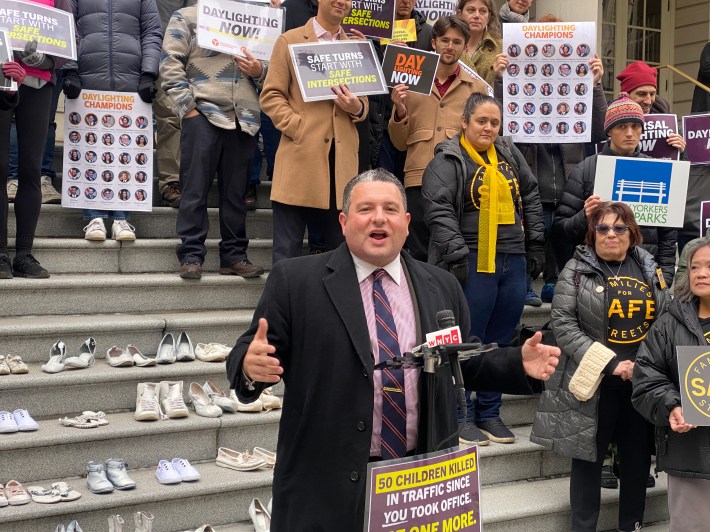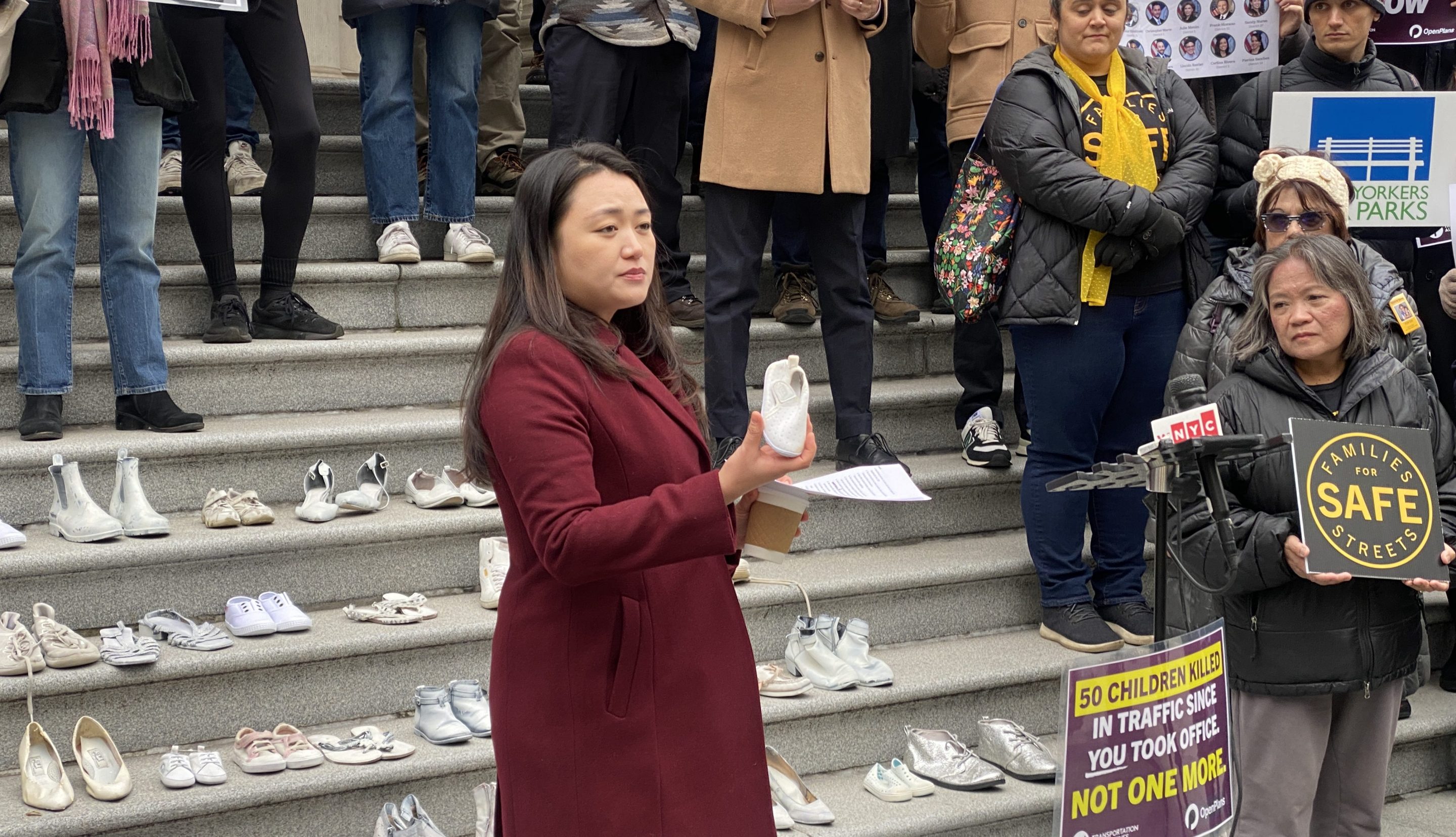City Council members will water down common-sense legislation that would ban parking within 20 feet of all intersections for better visibility to now limit the measure only to streets near schools after a full-on campaign of opposition by the Adams administration.
The amended bill to mandate the street safety design known as daylighting will now "focus on school zones," according to the bill's Council sponsor, who slammed Department of Transportation officials for working overtime to stymie the effort.
"It should not be this hard — we should not have had to take any amendments — to pass universal daylighting," Council Member Julie Won (D–Long Island City) said at a rally at City Hall on Wednesday. "But we are now being forced to focus on school zones. The Department of Transportation should be ashamed of themselves."
Won said she will "continue to fight" to make DOT add hard protections, like granite blocks or bike racks, to keep car drivers from parking at 1,000 corners each year. But Won and her staff declined to go into further specifics about how they might amend the bill, saying they were still negotiating.
In its unamended form, Won's bill, Intro 1138, would prohibit private car storage within 20 feet of all city intersections, which is already state law, though New York City is allowed to exempt itself. The bill has 26 sponsors, a majority, but supporters have been lobbying remaining politicians to get on board to reach the two-thirds majority needed to override an all-but certain veto by Mayor Adams.
That means convincing holdouts who have been hesitant to sign onto a law that would repurpose even a fraction of the city's three million street parking spots, a third rail for many politicians where car ownership is high.
One Queens holdout demonstrated the hold that car dependence has on her mind on Wednesday. Passing by the rally, Council Member Nantasha Williams (D–Jamaica) told advocates that she would be back the proven safety measure in school zones, but not in "residential neighborhoods."
"If there’s a school? Sure. Residential neighborhoods? No," Williams said, not indicating why a safety measure good for students is not suitable for everyone.
Most of Williams's colleagues have joined in support of the measure, including at least one Republican from Staten Island, who said the regulation was common sense and allowed New Yorkers to regain control over the street space for better sight lines – and even allow for flood prevention measures like rain gardens.
"This is not an anti-driver bill, this is not an anti-car bill, this is a bill that supports public safety for both drivers and pedestrians," said new Council Member Frank Morano (R–Staten Island). "If you support local control, if you support pedestrian safety, if you support driver safety, if you support mitigating flooding, to me, this is a no brainer."

Similarly, the Council's Transportation Committee Chair, Selvena Brooks-Powers (D–Far Rockaway), said the bill made sense, having seen widespread daylighting just outside her southeast Queens district and the city border in nearby Nassau County.
"We’ve seen that daylighting works, and as someone who represents a car-dependent community and who drives, I believe in daylighting," Brooks-Powers said.
The pols stumped with safe street advocates who lined the steps of the City Hall with pairs of shoes representing the 50 children killed by drivers since Mayor Adams and this Council took office nearly four years ago.
"The [DOT] commissioner should come and stare at these shoes and really understand the responsibility that he has taken on," Won said, brandishing a shoe.
Despite the likelihood of changes to the bill, Won added that lawmakers won't "allow [DOT] to push us around," and "water down the bill so much so that the bill has no meaning."
The agency's leaders and spokespeople have repeatedly insisted that the city should retain control over where to add daylighting, rather than be forced to implement it everywhere in a way that they consider "indiscriminate." DOT officials have successfully waged a campaign against the bill and peeled off at least one supporter, Upper West Side Council Member Gale Brewer, by telling her the law change would "remove" 13,000 parking spaces in one district.
The campaign against the daylight measure included a widely panned and admittedly flawed DOT study that had argued daylighting without hard infrastructure would actually increase injuries by the thousands each year.

But Council researchers fired back last month, accusing the agency of relying on faulty data (see above excerpt from the DOT's own report) that skewed their results, according to the internal review that Streetsblog uncovered this week. The Council researchers could not find any proof that daylighting led to more injuries, when they cleaned up the agency’s data and re-ran tests.
The Council rebuttal of the flawed DOT report also included a list of 16 studies showing the benefits of daylighting in safe places such as Hoboken, San Fransisco, Hong Kong and Lima.
Daylighting has been standard practice going back to the dawn of the automobile age in the 1920s. It is already the law across 44 states – including in New York, but the state law that bans parking at corners also allowed the Big Apple to exempt itself for reasons that elude us to this day, but certainly center on car owner demands.
A DOT spokesman said the agency has not received the amended bill language yet, and that the agency will review the changes. The rep also continued to stand by the agency's contested study.
"We spent two years reviewing data from thousands of intersections across New York City and found that universal daylighting would not improve safety and could cause up to 15,000 additional traffic injuries per year," said Vin Barone. "There isn’t a one-size-fits-all answer to street safety, and we will continue to do what works best in the places where it works best so that we can save lives and keep people safe."
There are only a handful of Council voting sessions left this year to pass a bill and come back to override a likely mayoral veto, although lawmakers could also revisit the proposal in the new year.
Mayor-elect Zohran Mamdani has pledged to implement universal daylighting and stand up to entrenched DOT bureaucrats, but advocates have still pushed for the legislation to codify the regulation into city law independently of whether a mayor wants it or not.






